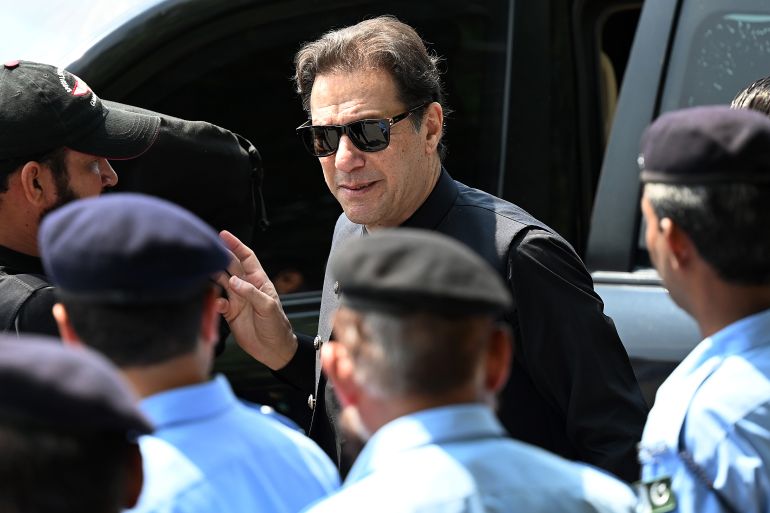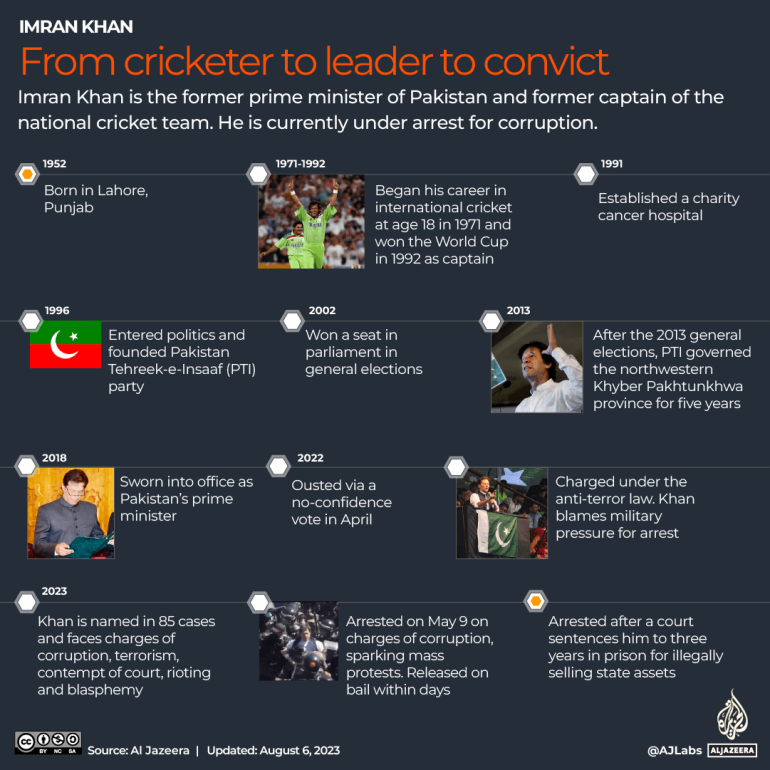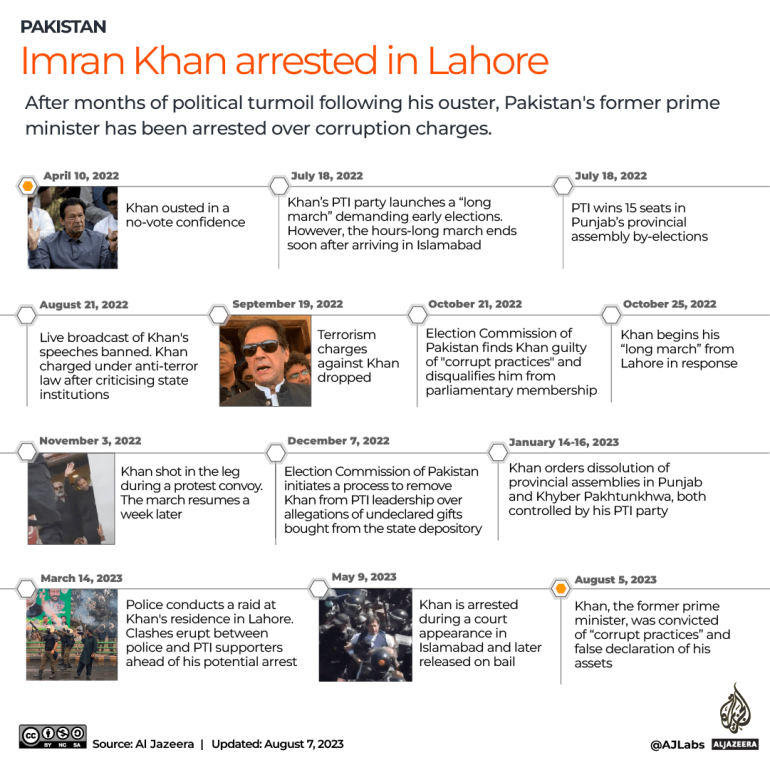How people in Kashmir reacted to Imran Khan’s jail sentence, politics ban
Khan, who was PM when Kashmir autonomy was scrapped, has been jailed in a corruption case for three years and barred from politics for five.

Srinagar, Indian-administered Kashmir – The arrest and imprisonment of former Pakistani Prime Minister Imran Khan in a corruption case has angered many in Indian-administered Kashmir.
Ghulam Mohammad, 70, told Al Jazeera he was in disbelief at seeing the turn of events in a country that claims Kashmir in its entirety and has been supporting a struggle for self-determination on the Indian side.
Keep reading
list of 4 itemsPakistan’s Imran Khan jailed: Is it the end of his political career?
India’s Kashmir clampdown continues four years after Article 370 abrogated
Did India-Pakistan ‘performance’ steal limelight at SCO summit?
A resident of Srinagar’s Habba Kadal area, Mohammad said it was the second time in the past year he felt anguished after seeing his favoured leader being “ill-treated” which he believed “Khan doesn’t deserve”.
“I am at a loss for words. I don’t know what to say any more,” he said, sitting in his small room on the second floor of his house and watching the updates from Pakistan on his mobile phone.
This time though, Mohammad was mentally ready to see the action against Khan without endangering his health. It wasn’t the case last year.
On the evening of April 10, 2022, soon after Khan was removed as prime minister after he lost a no-confidence vote in parliament, Mohammad complained of chest pain and was rushed to a hospital where the doctors said he had suffered a “mild heart attack” due to stress.
“I got very upset when I heard that Khan had been removed from office,” Mohammad told Al Jazeera.
Anger over Khan crackdown
Khan, who served as prime minister between 2018 and 2022, was charged in nearly 150 cases after his removal, including corruption and “terrorism”. The charges came after he blamed the country’s powerful “establishment” – a euphemism for the powerful military which also dabbles in politics – for his removal.
Finally, after a series of court appearances and a brief arrest in May, a court in capital Islamabad on Saturday sentenced the cricketing legend-turned-politician to three years in prison in a case related to the non-declaration of gifts he received from foreign leaders and governments when he was the premier.
On Tuesday, Pakistan’s election commission barred him from politics for five years due to his conviction. Khan has denied all the charges.
Khan’s Pakistan Tahreek-e-Insaf (PTI) party says nearly 10,000 of its leaders and supporters have also been arrested in the government crackdown since May, while dozens of top PTI leaders have quit the party, reportedly under pressure from the military.
Mohammad, who says he is an avid political observer, told Al Jazeera that Khan’s approach towards India on the Kashmir issue was the most striking thing about him.
“I believe if Khan would have continued as a prime minister and Modi [India’s prime minister] would have shown some flexibility, the resolution of the Kashmir issue could have been possible,” he said.

Mohammad is not alone in thinking along these lines in Indian-administered Kashmir, where pro-Pakistan sentiment is rampant. A decades-old rebellion against New Delhi there seeks to either merge with Muslim-majority Pakistan or form an independent state.
Many Kashmiris remember Khan’s first address as prime minister in 2018 when he urged India to “take one step forward, we [Pakistan] will take two” in resolving the dispute.
The call was well received in Indian-administered Kashmir and many residents saw a rare glimpse of hope.
Months later, a new and unprecedented misfortune struck the region. On August 5, 2019, Indian Prime Minister Narendra Modi’s government unilaterally abrogated the region’s special status guaranteed by the Indian constitution and brought the country’s only Muslim-majority region under direct federal control.
The move forced Pakistan led by Khan’s government to downgrade diplomatic and trade ties with India, which have not yet been restored.
Meanwhile, a series of laws and policies imposed by New Delhi to further tighten its grip over Indian-administered Kashmir have worsened the already tense relations between the two South Asian nuclear powers.
But many in the region still believe Khan was their best bet in negotiating with India to find a solution to the Kashmir crisis.
In an interview in June this year with the Atlantic Council, a prominent United States-based think tank, Khan said despite India’s 2019 move, the then-Pakistan government headed by him was working on a “peace proposal with India” that would have seen New Delhi announce “some sort of road map” for the Kashmir issue and could have also led to a visit by Modi to Pakistan.
“[There] was supposed to be a quid pro quo. India was supposed to give some concessions, give some sort of a road map to Kashmir, and I was going to host Prime Minister [Narendra] Modi in Pakistan. But it never materialised. So, it never went further than that. That’s how it was,” Khan had said.
‘My thoughts towards Pakistan have changed’
The Himalayan territory of Kashmir has been the subject of a bitter dispute between Hindu-majority India and mainly Muslim Pakistan since 1947, when the borders of the two countries were drawn along religious lines by the departing British colonial rulers.
Since then, the two countries have fought two of their full-scale wars over Kashmir. Tens of thousands of people have been killed since an armed rebellion against Indian rule began in 1989.
New Delhi accuses Islamabad of backing the rebels with weapons, money and training. Islamabad denies the charges, saying it only provides diplomatic support to the rebel movement.
But the crackdown against Khan and his party has angered many Kashmiris.
“I am stunned to see this face of Pakistan. I never expected that its army could be so brutal against its own people. My thoughts towards Pakistan have completely changed after seeing what has happened with Imran Khan and his party,” said Irfan, a 27-year-old shopkeeper from the Rajbagh area of Srinagar.
Pakistan’s military has organised several coups and directly ruled over the country for more than three decades. Many observers call it the most powerful institution in Pakistan, which had even backed Khan during his rise to power.
But the relations soured when Khan was in power, resulting in his eventual overthrow.
Irfan said for him, Pakistan is the most “corrupt country where the army holds the ultimate power”.
“These days you can’t hide things. With social media, you come to know about everything. The way police are arresting and humiliating women and the media is being muzzled, it feels like Kashmir,” he said.
Khan’s rise to fame in Kashmir is largely attributed to him portraying himself as an anti-corruption crusader.
“What have Nawaz Sharif or [Asif Ali] Zardari done for us all these years apart from filling their own coffers and living luxuriously in European countries? They are all a bunch of corrupt people who looted Pakistan all these years,” Imran Hussain, owner of a business in Kashmiri handicraft, told Al Jazeera.
Nawaz Sharif, thrice the prime minister of Pakistan, was convicted of corruption charges. He fled to London where he is currently in exile as his brother, the outgoing Prime Minister Shehbaz Sharif, tries to clear the legal and political hurdles for his return to the country ahead of national elections.
Zardari, the former president of Pakistan and head of the Pakistan People’s Party (PPP), had earned the moniker, Mr Ten Percent, following allegations of corruption when his wife, the late Benazir Bhutto, was the prime minister.
In 2017, Pakistan’s Supreme Court dismissed Nawaz Sharif from the prime minister’s office after the Panama Papers controversy. Similarly, in 2020, Zardari was indicted in a money laundering case, a year after he was briefly arrested in a separate laundering case.
Both Sharif and Zardari were in alliance in Shehbaz Sharif’s outgoing government, whose tenure will end on Wednesday after the National Assembly is dissolved.
“How come these families who were the most corrupt till yesterday were ruling over the country again?” asked Tariq Jeelani, a resident of Rainawari in Srinagar.
Jeelani, a student of political science, believes Khan had the potential to be a world leader.
“Look at his speech at the UN [United Nations] on Kashmir after Article 370 was removed. See the respect he was getting when visiting other countries,” he said.
But Khan is not the first Pakistani leader to gain widespread popularity in Kashmir.
In the 1960s, military leader Field Marshal Ayub Khan became popular in the region after he launched Operation Gibraltar, a covert Pakistani army operation in Indian-administered Kashmir to trigger a mass uprising against India.
Similarly, PPP founder and former Pakistani Prime Minister Zulfikar Ali Bhutto’s speech of “waging 1,000 years war” with India in 1965 made him an instant hit in the disputed Himalayan region.
Military rulers General Muhammad Zia Ul Haq and Pervez Musharraf also gained popularity among the Kashmiris due to what residents considered their firm approach on the Kashmir issue.
However, no contemporary Pakistani politician matches Khan’s popularity in the region.

Khan’s Kashmir stand more complex: Experts
But experts insist on caution in celebrating Khan’s Kashmir stand.
Kashmiri political analyst and scholar Sheikh Showkat Hussain told Al Jazeera that though Kashmiris do feel negatively about Pakistan and its army after Khan’s imprisonment, it is Pakistan’s state policy on Kashmir that matters in the long run, not an individual’s approval or dislike.
“Political and economic stability of Pakistan has always been a factor in orienting Kashmir politics. But ultimately it is the Pakistan state’s narrative that prevails over here [Kashmir],” Hussain said.
Citing an example, Hussain said Indian-administered Kashmir witnessed widespread discontent after the hanging of Zulfikar Ali Bhutto in 1979, but within a decade, in 1988, Kashmiris also mourned the death of General Zia ul Haq – who had ordered Bhutto’s hanging – in an air crash.
“So Kashmiris might be feeling negatively about the ouster of Imran Khan, but eventually it depends as to how the new dispensation manages the country and recasts its Kashmir policy,” Hussain told Al Jazeera.
Hamid Mir, a prominent Pakistani journalist, said if Khan is seen as the most popular leader in Kashmir, then he should explain why his government signed a ceasefire agreement with India after August 5, 2019.
“I think his silence was like a betrayal to Kashmiris. Many Pakistanis called him Kashmir ‘farosh [seller],” Mir told Al Jazeera, adding that many Pakistani leaders lost power and popularity in Pakistan when they tried to compromise with India on the Kashmir issue.
Ajay Bisaria, the Indian High Commissioner to Pakistan from 2017 to 2020, said though he believes Khan is a “sincere politician”, he had an “immature team” to handle the Kashmir issue with India.
“He [Khan] did start off with wanting a better relationship with India but because of his inexperienced and immature team, a lot of things went wrong, particularly his strange, inflexible and undiplomatic position that there can’t be talks with India unless Article 370 is restored,” Bisaria told Al Jazeera.
Abdul Basit, a former Pakistani High Commissioner to India, said a dual policy adopted by Khan and the Pakistani army after August 5, 2019 “exposed Pakistan’s contradictory stand on Kashmir”.
“[They] say one thing and do another. And that is why Pakistan has not been able to garner any international support on Kashmir after India abrogated the special status of Kashmir,” he told Al Jazeera.